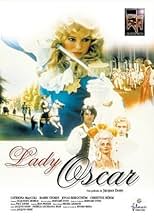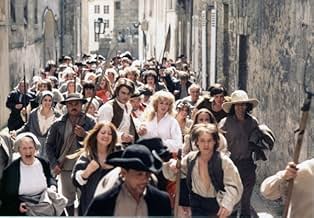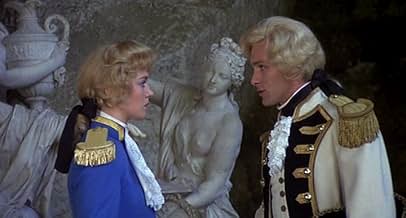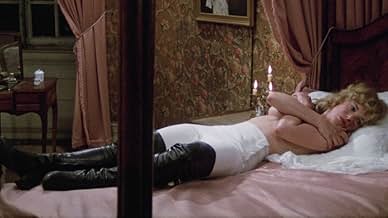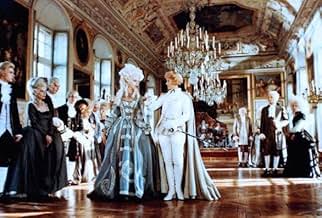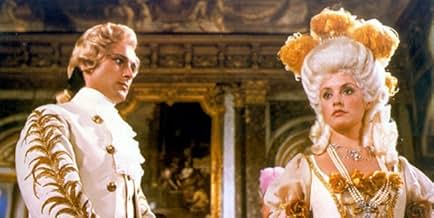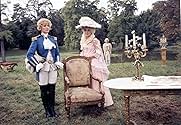Agrega una trama en tu idiomaThe story of Lady Oscar, a female military commander who served during the time of the French Revolution.The story of Lady Oscar, a female military commander who served during the time of the French Revolution.The story of Lady Oscar, a female military commander who served during the time of the French Revolution.
- Dirección
- Guionistas
- Elenco
Opiniones destacadas
I love the Rose of Versailles (Lady Oscar in West) original comics and was a pleasure to watch this movie. However it's necessary to say it's just for fans. When you previously know the characters and want to get in touch with an alternative point of view, it's OK, but if you take Lady Oscar as a movie about the French Revolution's or a cross dresser heroine, you probably would feel disappointed.
The work was not as good as it would be; some actors and actresses were not well chosen; main events were forgotten; and Oscar's personal drama lost force. But as I said, I liked it a little, because any Lady Oscar's product would attract me.
The work was not as good as it would be; some actors and actresses were not well chosen; main events were forgotten; and Oscar's personal drama lost force. But as I said, I liked it a little, because any Lady Oscar's product would attract me.
Jacques Demy's movie of Lady Oscar frequently moved me. It is not a "swashbuckler" in spirit, it does not glamourise violence; it is not a movie about "girl power". It is a tragedy that raises important questions about freedom and gender. After becoming father to a series of daughters whose mother dies in childbirth, Général de Jarjayes decides that his latest daughter will in fact be a son, Oscar, and brings her up to be an heir and defender of the de Jarjayes name. He is delighted to find her a position as bodyguard to Marie Antoinette. Oscar is unquestioning of the system into which she is inducted, a bubble of privilege, acid wit, and decadence. She is dutiful and she "knows her place". At the same time the young boy and later groom who was her companion when Oscar grew up seems to have much more class consciousness.
What her gender transformation helps to do is to de-romanticise the material, when Oscar accepts a duel, the result, devoid of machismo, comes off as a banal murder, which is precisely what it is. It is difficult to wholeheartedly see Oscar as an éoniste or transgender hero as her identity as Oscar is created for her by her father. Indeed her self-actualisation is intertwined with her accepting a more female identity. On the other hand she does use her identity as Oscar to react against male society, and becomes a role model for some of the Versailles women.
Oscar, despite adopting a male role, is not free. This is potentially quite an important point of the movie, equality and freedom are not the same thing. Her role is to hang around the wilful and indolent Antoinette, and she develops a strong sense that her life has become meaningless. To become a man is not to have meaning, it's an escape from a trap within a trap, the outer trap being the Ancien Régime in the case of this movie. When Oscar attempts to enter a regiment, her male soldiers refuse to obey her, and her superior officer gives her no support whatever. In any case the regiment only exists to suppress the people.
At a very late stage Oscar finds freedom in an act of defiance. You can feel the weight lift off her shoulders as she spends her first day as a truly free adult, despite residing in a prison cell. This feels very contemporary, freedom is something very few of us are born with, it's something we have to seize, it's profoundly personal and cathartic.
Another reviewer on this site refers to Barry Lyndon as inspiration, "Now the magic of that was its carefully spaced vacuums. It had engineered emptiness, something that only a master could do." That is definitely something Lady Oscar is attempting, in my belief it worked better than my fellow reviewer felt.
A note on historical accuracy. Thomas Jefferson described Marie Antoinette as, "...proud, disdainful of restraint, indignant at all obstacles to her will, eager in the pursuit of pleasure, and firm enough to hold to her desires, or perish in their wreck." That is exactly how she is portrayed in Lady Oscar by Christine Böhm. Jefferson also describes the relationship between the King and the Queen thus, "he had a Queen of absolute sway over his weak mind and timid virtue..." Again this seems to have been very well captured in the movie.
Lady Oscar is a politically complex movie which seems often to have been misjudged by relying on a fruitless comparative analysis with the animé and manga sources of the story. Whilst actually quite serious it does however have its gorgeous moments.
What her gender transformation helps to do is to de-romanticise the material, when Oscar accepts a duel, the result, devoid of machismo, comes off as a banal murder, which is precisely what it is. It is difficult to wholeheartedly see Oscar as an éoniste or transgender hero as her identity as Oscar is created for her by her father. Indeed her self-actualisation is intertwined with her accepting a more female identity. On the other hand she does use her identity as Oscar to react against male society, and becomes a role model for some of the Versailles women.
Oscar, despite adopting a male role, is not free. This is potentially quite an important point of the movie, equality and freedom are not the same thing. Her role is to hang around the wilful and indolent Antoinette, and she develops a strong sense that her life has become meaningless. To become a man is not to have meaning, it's an escape from a trap within a trap, the outer trap being the Ancien Régime in the case of this movie. When Oscar attempts to enter a regiment, her male soldiers refuse to obey her, and her superior officer gives her no support whatever. In any case the regiment only exists to suppress the people.
At a very late stage Oscar finds freedom in an act of defiance. You can feel the weight lift off her shoulders as she spends her first day as a truly free adult, despite residing in a prison cell. This feels very contemporary, freedom is something very few of us are born with, it's something we have to seize, it's profoundly personal and cathartic.
Another reviewer on this site refers to Barry Lyndon as inspiration, "Now the magic of that was its carefully spaced vacuums. It had engineered emptiness, something that only a master could do." That is definitely something Lady Oscar is attempting, in my belief it worked better than my fellow reviewer felt.
A note on historical accuracy. Thomas Jefferson described Marie Antoinette as, "...proud, disdainful of restraint, indignant at all obstacles to her will, eager in the pursuit of pleasure, and firm enough to hold to her desires, or perish in their wreck." That is exactly how she is portrayed in Lady Oscar by Christine Böhm. Jefferson also describes the relationship between the King and the Queen thus, "he had a Queen of absolute sway over his weak mind and timid virtue..." Again this seems to have been very well captured in the movie.
Lady Oscar is a politically complex movie which seems often to have been misjudged by relying on a fruitless comparative analysis with the animé and manga sources of the story. Whilst actually quite serious it does however have its gorgeous moments.
The sad truth is that Jaques Demy is a horrible filmmaker. The much celebrated "Umbrella's of Cherbourg" was dreadful. Absolutely dreadful, but pretty in a stagy way. There isn't much you can say when you encounter something pretty but hollow. Of course it happens all the time to me, that I find movies with no soul. like girls trained to be empty.
But there is something notable when something is so very pretty as this is, and so very empty at the same time.
The provenance of this is at least interesting: a Japanese comic book. And if you wish to sit through it, you'll see copious references to "Barry Lyndon," on which this is clearly modeled. Now the magic of that was its carefully spaced vacuums. It had engineered emptiness, something that only a master could do.
This. This is just empty.
Ted's Evaluation -- 1 of 3: You can find something better to do with this part of your life.
But there is something notable when something is so very pretty as this is, and so very empty at the same time.
The provenance of this is at least interesting: a Japanese comic book. And if you wish to sit through it, you'll see copious references to "Barry Lyndon," on which this is clearly modeled. Now the magic of that was its carefully spaced vacuums. It had engineered emptiness, something that only a master could do.
This. This is just empty.
Ted's Evaluation -- 1 of 3: You can find something better to do with this part of your life.
I've watched this movie once over ten years ago and again today. I have also watched the anime and read the manga at different parts of my life and have taken away different things at times.
The movie is called Lady Oscar but it honestly feels more like it should be called "Andre, the manservant" or something else entirely (Rose of Versailles would have been ever more appropriate than Lady Oscar), as Oscar doesn't feel like much of a centerpiece of this movie, we're hardly privy to her thoughts and feelings and it seems to be dictated and stripped of her agency but every other force.
I personally did not dislike the acting this time around, it looks and feels quite theatrical, which can be jarring since the trend has been naturalistic for a long time. The scenes though are very clumsily strung together and don't make sense if you don't have the knowledge of the manga/anime. For example near the end when we see Oscar transfer to the French Guards, they don't respect her. We don't see them again until much later when Oscar and the guards are stationed against the peasants and Oscar refuses to attack the people and the guards somehow follow her. What the movie decided not to show was the relationship Oscar built with the guards and gained their respect.
In general the movie despite being called Lady Oscar failed to show the qualities that make Oscar stand out as a character and that still stands out despite the passage of time. Oscar has a lot of internal conflict in the original source as well as physical prowess due to her training from a young age, she is also educated as she is a noble and very aware of the ideas of the revolutionaries. Instead in this movie Oscar's qualities are transferred onto Andre for some reason, elevating him to a totally different status and playing up the old tired cliche of the man saving the damsel in distress.
Regardless, I can understand that an adaptation is not always meant to be faithful and directors like to focus on specific themes of the original source and such a projected can be appreciated as a stand alone thing. This is where it hits the mark once more. This movie cannot stand alone and make sense or appear well-rounded. As I mentioned earlier the scenes are strung together clumsily and a lot of important stuff is mentioned and glossed over, and to think this movie is two hours. You cannot focus on both Marie Antoinette and Oscar in just two hours unless you do a masterful job of combining both sides, which could work I believe and of course you'd have to cut a big chunk of the manga and alter even more of it than has already been altered, which I would not be opposed to if it guaranteed a movie that could be watched, appreciated and evaluated as a stand alone piece.
Unfortunately though the movie requires you have some understanding of the happenings of the manga/anime that it refuses to spend more time on and its female lead is hardly likeable if you're a fan.
The actors also feel rather miscast, with Oscar appearing in full makeup for some reason and looking positively delicate and Andre looking quite macho despite being much more lithe in appearance and submissive in behavior. Marie Antoinette is also rather young and foolish, but her actress appears a lot older, which might be an informed choice to magnify her impulsiveness and lack of seriousness and understanding of the situation.
I feel like this would have worked a lot more as a theatrical play perhaps than a movie. For me it seems to lack the understanding of what makes the original appealing and especially a character like Oscar who you never see. And even if they decided to focus on themes instead of a character study, I feel like there are a lot more poignant movies out there with similar themes that work a lot better as a movie.
The ending was atrocious.
The movie is called Lady Oscar but it honestly feels more like it should be called "Andre, the manservant" or something else entirely (Rose of Versailles would have been ever more appropriate than Lady Oscar), as Oscar doesn't feel like much of a centerpiece of this movie, we're hardly privy to her thoughts and feelings and it seems to be dictated and stripped of her agency but every other force.
I personally did not dislike the acting this time around, it looks and feels quite theatrical, which can be jarring since the trend has been naturalistic for a long time. The scenes though are very clumsily strung together and don't make sense if you don't have the knowledge of the manga/anime. For example near the end when we see Oscar transfer to the French Guards, they don't respect her. We don't see them again until much later when Oscar and the guards are stationed against the peasants and Oscar refuses to attack the people and the guards somehow follow her. What the movie decided not to show was the relationship Oscar built with the guards and gained their respect.
In general the movie despite being called Lady Oscar failed to show the qualities that make Oscar stand out as a character and that still stands out despite the passage of time. Oscar has a lot of internal conflict in the original source as well as physical prowess due to her training from a young age, she is also educated as she is a noble and very aware of the ideas of the revolutionaries. Instead in this movie Oscar's qualities are transferred onto Andre for some reason, elevating him to a totally different status and playing up the old tired cliche of the man saving the damsel in distress.
Regardless, I can understand that an adaptation is not always meant to be faithful and directors like to focus on specific themes of the original source and such a projected can be appreciated as a stand alone thing. This is where it hits the mark once more. This movie cannot stand alone and make sense or appear well-rounded. As I mentioned earlier the scenes are strung together clumsily and a lot of important stuff is mentioned and glossed over, and to think this movie is two hours. You cannot focus on both Marie Antoinette and Oscar in just two hours unless you do a masterful job of combining both sides, which could work I believe and of course you'd have to cut a big chunk of the manga and alter even more of it than has already been altered, which I would not be opposed to if it guaranteed a movie that could be watched, appreciated and evaluated as a stand alone piece.
Unfortunately though the movie requires you have some understanding of the happenings of the manga/anime that it refuses to spend more time on and its female lead is hardly likeable if you're a fan.
The actors also feel rather miscast, with Oscar appearing in full makeup for some reason and looking positively delicate and Andre looking quite macho despite being much more lithe in appearance and submissive in behavior. Marie Antoinette is also rather young and foolish, but her actress appears a lot older, which might be an informed choice to magnify her impulsiveness and lack of seriousness and understanding of the situation.
I feel like this would have worked a lot more as a theatrical play perhaps than a movie. For me it seems to lack the understanding of what makes the original appealing and especially a character like Oscar who you never see. And even if they decided to focus on themes instead of a character study, I feel like there are a lot more poignant movies out there with similar themes that work a lot better as a movie.
The ending was atrocious.
I've finally had the chance to watch Jaques Demy's movie - Lady Oscar. I waited so long to see it and i put so much enthusiasm on it that i almost can't bear the disappointment. As a big fan of Ryoko Ikeda, of "Berusaiyu no bara" and of the Japanese musical version of it, i have to confess: the movie HURT! The acting is so bad, the story is so cut, no fluidity between scenes ... and the end ... oh, that is really painful!!! Oscar is too cute ... no! better said: "sweet"... but OK. Marie Antoinette too stupid! Fersen .. where is Fersen??? So little appearance that i forgot he existed. Girodelle .. oh! ... disgusting! And was that brown haired girl really Rosalie? I think it was the opposite of her. The only character i can't comment on it, is Andre. He was (especially on the first part of the movie) ... he was Andree. He was human, real and acted well .. Pity he ended so stupid ... Everything in this movie have no meaning ... and some scenes are just ridiculous.
¿Sabías que…?
- TriviaThe major sponsor of the film was the Japanese cosmetics company Shiseido. Catriona MacColl (Oscar) promoted a red lipstick for the spring cosmetic line that year.
- ErroresIn the ballroom scene we see a string quartet and a harpsichordist. However, we hear the soundtrack of a string orchestra.
- ConexionesFeatured in L'univers de Jacques Demy (1995)
Selecciones populares
Inicia sesión para calificar y agrega a la lista de videos para obtener recomendaciones personalizadas
- How long is Lady Oscar?Con tecnología de Alexa
Detalles
- Tiempo de ejecución2 horas 4 minutos
- Mezcla de sonido
- Relación de aspecto
- 2.35 : 1
Contribuir a esta página
Sugiere una edición o agrega el contenido que falta

Principales brechas de datos
By what name was Lady Oscar (1979) officially released in India in English?
Responda

